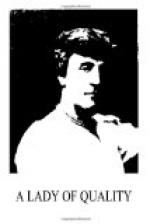“It is only goddesses,” said the voice, “who waft about them as they move the musk of the rose-gardens of Araby. When you come to reign over us in town, Madam, there will be no perfume in the mode but that of rose-leaves, and in all drawing-rooms we shall breathe but their perfume.”
And there, at her side, was bowing, in cinnamon and crimson, with jewelled buttons on his velvet coat, the beautiful being whose fair locks the sun had shone on the morning she had watched him ride away—the man whom the imperial beauty had dismissed and called a popinjay.
Clorinda looked under her lashes towards him without turning, but in so doing beheld Anne standing in waiting.
“A fine speech lost,” she said, “though ’twas well enough for the country, Sir John. ’Tis thrown away, because ’tis not I who am scented with rose-leaves, but Anne there, whom you must not ogle. Come hither, sister, and do not hide as if you were ashamed to be looked at.”
And she drew her forward, and there Anne stood, and all of them stared at her poor, plain, blushing face, and the Adonis in cinnamon and crimson bowed low, as if she had been a duchess, that being his conqueror’s way with gentle or simple, maid, wife, or widow, beauty or homespun uncomeliness.
It was so with him always; he could never resist the chance of luring to himself a woman’s heart, whether he wanted it or not, and he had a charm, a strange and wonderful one, it could not be denied. Anne palpitated indeed as she made her curtsey to him, and wondered if Heaven had ever before made so fine a gentleman and so beautiful a being.
She went but seldom to this room again, and when she went she stood always in the background, far more in fear that some one would address her than that she should meet with neglect. She was used to neglect, and to being regarded as a nonentity, and aught else discomfited her. All her pleasure was to hear what was said, though ’twas not always of the finest wit—and to watch Clorinda play the queen among her admirers and her slaves. She would not have dared to speak of Sir John Oxon frequently—indeed, she let fall his name but rarely; but she learned a curious wit in contriving to hear all things concerning him. It was her habit cunningly to lead Mistress Margery to talking about him and relating long histories of his conquests and his grace. Mistress Wimpole knew many of them, having, for a staid and prudent matron, a lively interest in his ways. It seemed, truly—if one must believe her long-winded stories—that no duchess under seventy had escaped weeping for him and losing rest, and that ladies of all ranks had committed follies for his sake.




